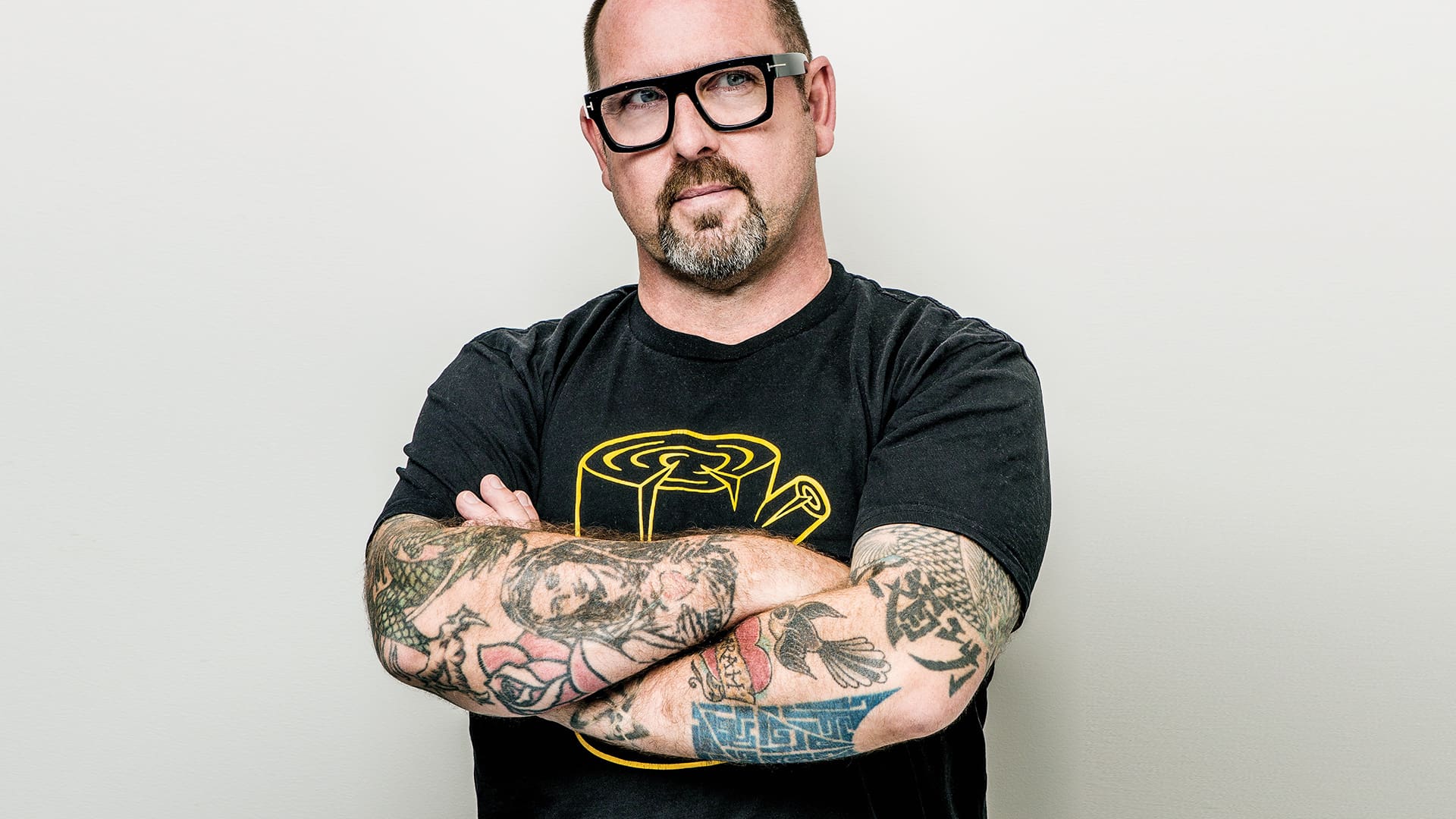Driving Creativity
What does one of New Zealand’s pioneering hip hop musicians, one of New Zealand’s most renowned visual artists, and the co-owner of the Lucky Taco have in common? They are all Otis Frizzell. You would expect that the son of NZ art icon, Dick Frizzell, would come out a bit creative in a particular field, but Otis doesn’t really seem suited to just one field.
His creativity has helped shaped New Zealand music, New Zealand street art, New Zealand tattoo art, New Zealand fine art, and over the last few years, he has been helping to shape the New Zealand food scene with The Lucky Taco, which he started in 2013 with his wife, Sarah.
And if all that culture defining stuff wasn’t enough, Otis is also setting a new example of authentic brand partnership in an age of fickle social media influencers, with his relationship with Jaguar. Otis is a Jaguar customer and Jaguar is an Otis customer, after hiring him to produce a limited run of leaping Jaguar prints as gifts for customers. It’s a relationship that has produced a number of pieces of authentic content and has even seen Otis and Sarah taking a Jaguar E-Pace Taco Tour of Southern California, hanging out with Melissa Etheridge on the way… as you do.
What makes a good taco?
A soft corn tortilla. Some people do prefer flour, but I myself like corn. It’s very simple. It’s fresh, not overdone. The taco is a perfect food because when you get a bite, there’ll be hot meat, there’ll be spicy salsa, or you would have crunchy onion. You get hot, sweet, tart, crunchy, warm, everything. It’s like a salad all wrapped up with the meat in a little corny blanket, which is the beauty of it.
We’ve embellished the taste of the taco. The classic tacos in LA are just a bit of meat and salsa. We put a bit of red cabbage on, a little bit of salsa, bit of coriander. It’s just slightly Ponsonby-d.
Are there taco purists who question what you do?
There are, but when they eat it, they like it. It’s funny because you can get a $1 taco or $2 tacos in LA. Our tacos are $8, which some people think is outrageous. But avocados are expensive and coriander is expensive and so is lime. The three of the most important parts of your taco are really expensive here, but they’re very cheap in Mexico or in LA.
I grew up eating Old El Paso, like half of New Zealand did. Hard shells with grey mince, cheddar cheese and iceberg lettuce. It doesn’t exist as a taco. That’s a construct, it’s a Tex-Mex style one.
Avocado, lime, salt, and a bit of coriander is guacamole. It’s simple and awesome. Sometimes we’ll eat tacos three, four, five days a week. Sarah and I joke that if we eat one of our tacos and don’t like it, it’s over. We’ll go to festivals or jobs and there’ll be six food trucks and all I want is a taco.
But there are some really excellent food trucks in Auckland at the moment. We’re fortunate to almost be the first ones with a real food truck doing really great food. We got ahead of the gate. It wasn’t the plan, but there’s great food out there.
My favourite is Hapunan, they are a Filipino food truck. Temaki are a Korean-Japanese fusion one and they do a sushi that’s rolled like an ice cream cone, which is incredible.
It’s great, the food truck movement. But I see them and I’m like, ‘Oh, you poor bastards. What have you got yourself into? What have you done?’ The really good ones stick around, but some of them just drop off. It’s too hard.
How does the partnership with Jaguar work?
I love the car, they love the art. When we take the taco truck and do an event for Jaguar, they pay us to be there. The truck isn’t part of the deal, but they love the tacos.
Do you think people are more conscious of these influencer partnerships?
Someone told me I was an influencer and I want to punch him in the face. I guess an influencer with substance is what I don’t mind being. That’s why I like what we’ve got going on with Jaguar.
It’s not just like ‘Be cool in our car.’ I’m not even really an ambassador. It’s more of a partnership. I don’t even know what the word is.
In a world where everyone has access to a potential audience and has a platform to share their opinion, what’s your take on feedback?
It’s funny because it’s an era of extremes. People either love it, or it is the worst thing ever. People have stopped saying, ‘Oh, it was quite good,’ or ‘I didn’t care for it that much.’ It’s either the best or the worst.
There’s the self-importance aspect as well. For the taco truck, we get emails saying, ‘Hey, if you come to my party, I won’t pay you, but I’ll do lots of photos on my Instagram feed.’ It’s like, ‘who the hell are you and why would we do that?’ Everyone’s welcome to it, but you’ve got to pick through it.
Everything that you’ve done is bearing your soul to the world, whether it’s music, or art, or the food side of things. How do you deal with that environment of feedback in this time?
A lot of it is water off a duck’s back. A lot of people think I’m s**t, but a lot of people think I’m cool, so I never take myself too seriously. It’s sort of bearing my soul, but there’s mostly a bit of humour in everything I do. There’s a bit of self-deprecation.
I’ve been lucky. I’ve never had a 9-5 job. I’ve done lots of jobs, I do stuff and get paid money. But I’ve never had a typical job, so I’ve just got to be self-sufficient and deal with the s**t. But on the good side of that, I’ve spent my whole life doing mostly what I want to do.
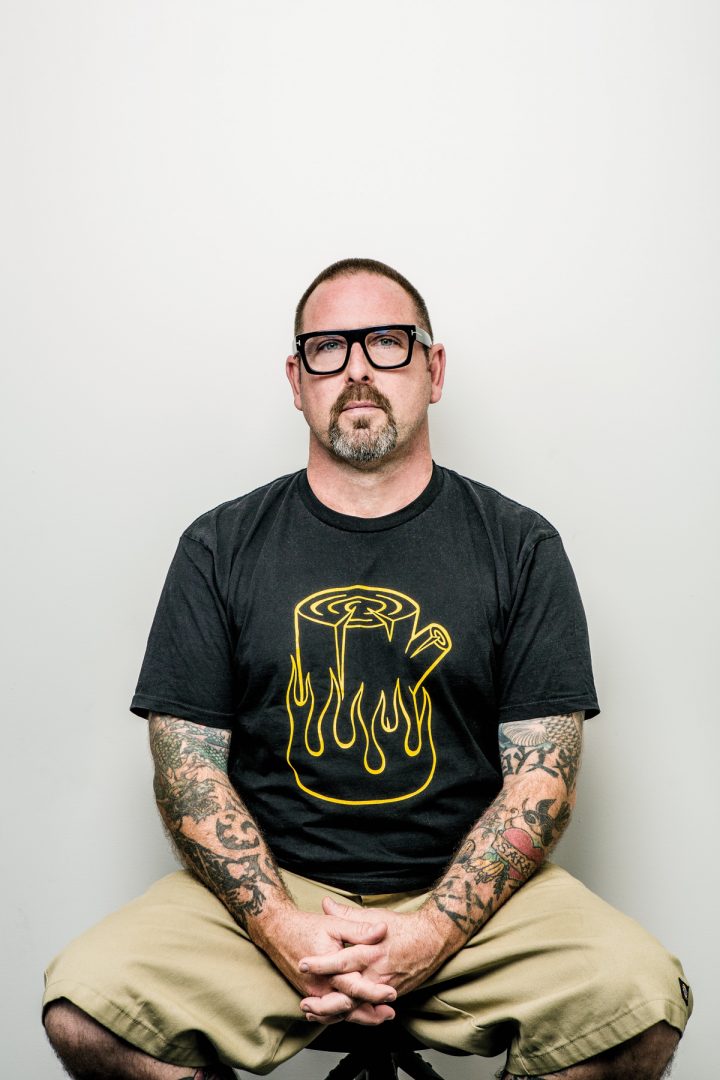
Has there ever been a plan?
No, never. Never a plan. When I left school, I remember talking to mum and dad and saying that I like art so should I go to art school? I don’t like school.
I don’t really like educational institutionalised environments. I thought I could maybe go to art school, but I was already painting murals and designing t-shirts and doing logos for bands, so Dad was like, ‘You’re just already doing it. You’ve done your prelim just by participating.’ And so, all of a sudden, I just was an artist because that’s what I did.
Did you feel like there was any sort of shadow there?
No, I actually say it was more like being in his light than under his shadow. He’s very supportive. Mum and dad are amazing. Mum’s big thing was just don’t be a dick. That was her best advice. You don’t have to do this, you don’t have to get a job, you don’t have to do anything. Just try and be a good person. There was no religion in my family, that was the closest thing to it.
I was with a friend in high school and we used to rap Shakespeare sonnets in drama class. We wrote a song and we used to rap it at friend’s parties. We wrote another song and someone invited us to do some raps at their nightclub. And then someone came along was like, we should record these raps onto a record. And so then, I was an artist and a rapper. I didn’t plan to be this rapper. Active participation dictated what I was.
I like to get tattoos and I was hanging out at a tattoo studio and the artist would let me do designs for clients. I was getting lots of tattoos and one day [the tattoo artist] was like, ‘If you learned to tattoo, you could actually just do your own drawings on these people.’ So I did and then all of a sudden, I was a tattoo artist.
There was no master plan, I just like to do stuff and then I would find myself doing it. And then I was it.
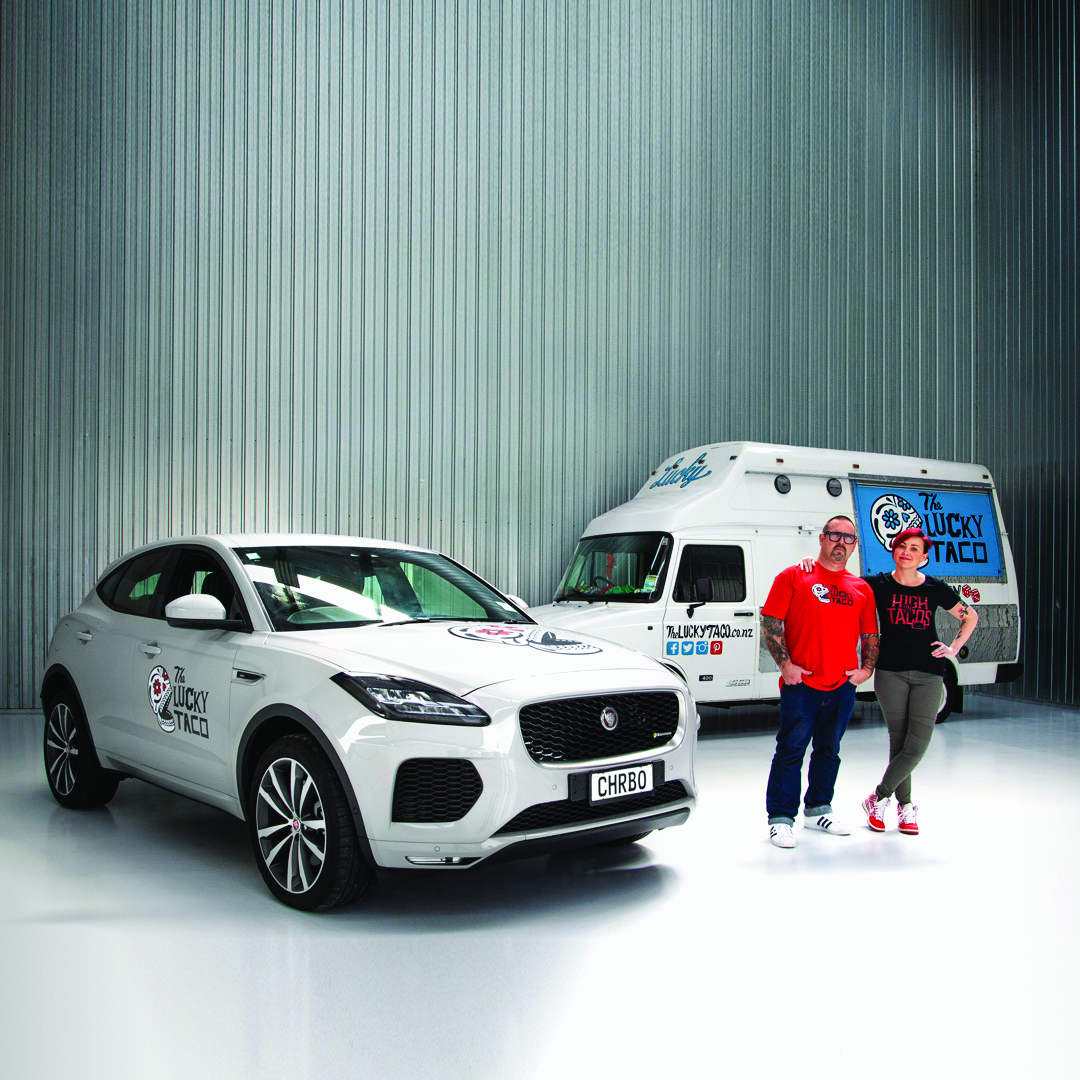
How do you juggle the monetisation of the things that you are passionate about? Was that a difficult balance?
As a young man, I never had any money at all, but didn’t really need it. I’d do a graffiti job and get paid some money, I’d do a gig and get paid some money, but with no income. But all I did was hang out with my mates and smoke weed and people would give me shoes because we’d been on the TV, and I’d get cool gear because I was rapper. I’d get lots of free stuff.
It was pre-influencers and I would go to clubs where I played and I knew the barman and he would give me free drinks. I didn’t really have to have much money. I just moved in a money-free zone. As long as I had enough money for some weed and food.
It’s interesting that you’re talking about being part of that culture, but also shaping it in a lot of ways in whatever you did.
In hindsight, it’s a really interesting part of it. At the time, there was no plan. It didn’t feel that important.
But the act of participating significantly means you then cement yourself in the history of the culture, which was really cool.
You spoke about the humour in your work, are there other things that define what you shaped in it?
I’ve always been a bit of a bleeding lefty. That was ingrained into my DNA by my parents. There was always shades of giving a s**t about people or the environment, but never a big protest sign or bashing it.
But we did songs about the environment, we did songs about smoking weed. We did songs about getting turned down by chicks on hot dates. It was all very important. It’s important to us, but again it was sort of agenda free.
My significant works weren’t very deep, I’m not very deep. I wasn’t really expressing my inner demons or anything on paper. I was literally just doing stuff that I thought looked cool that people would put on their walls.
We’re in an age now where there’s a lot of polarization, there’s a lot of galvanization. It seems when you’re talking about this age where there was this humour and irreverence, that you didn’t need to go too deep. Does it feel different now?
Have you seen the new [Dave] Chappelle special on Netflix? I think he’s brilliant because when he talks, he cares. He gets grief for making jokes about trans people. But I think his jokes actually have a real depth and empathy.
More people do need to learn to have a laugh and not take everything so seriously. We were working recently with this young trans kid and it’s just super cool. All of his friends are just totally cool with it and it’s a pretty amazing place to be.
It’s a transitional process I suppose. If you’re trans and people find it hard, you can’t give them s**t, because it’s ingrained into their culture that it’s unusual. It’s going to take a bit until it’s completely accepted and cool. I’m lucky my folks are very open-minded and brought me up to not be a dick, to be nice to people.
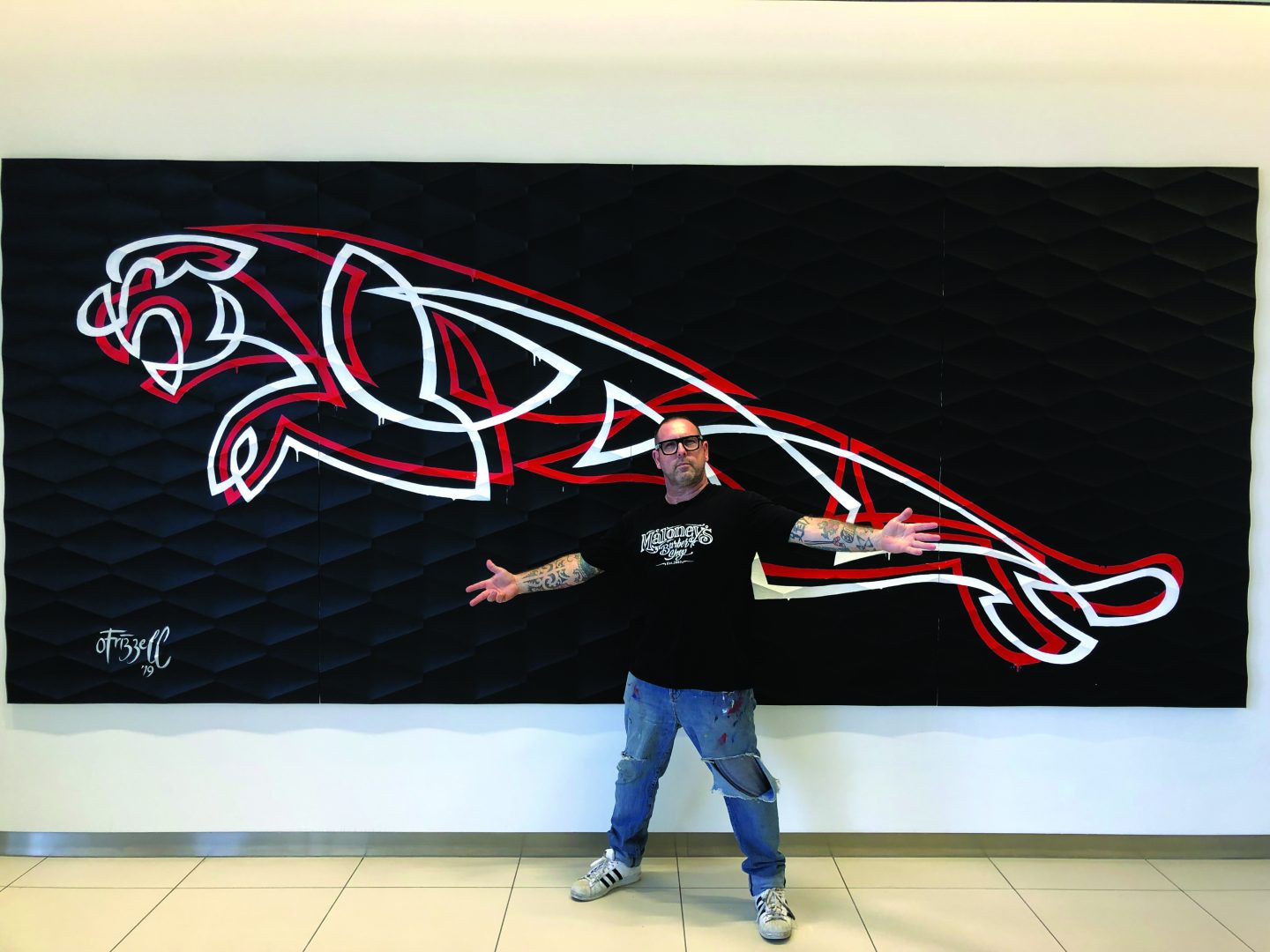
How did your Southern California trip come about?
Over a year ago, I did an unusual job for a cat food business. The winner was supposed to be in Auckland and I was to deliver the prize, which was a portrait of their pet done by me. Strange story, but bear with me.
The person who won wasn’t in Auckland, they were out of town, so it was going to take me a whole day to drive there. The cat food company offered to get a nice car for the drive, so they managed to hook me up with a Jaguar. Sarah took a photo of me in front of the Jaguar saying, ‘check out my new ride’.
It was a joke, but it got a lot of traction on social media and people were like, ‘Oh that’s pretty cool that Jaguar’s associating with tattooed artists with food trucks, rather than English gentleman or Hollywood stars.’ Jaguar noticed this thread and called me up and said, ‘I’d like to talk to you about potentially doing something together.’ They thought it was a good look.
Their idea was to do an edition of screen prints, putting my art into it. They wanted to buy the whole edition and if someone buys a new Jaguar, they will get this limited edition Otis Frizzell screen print. I thought it was a great idea and I priced it all out and then offset it by taking a lease on a car for a year. That way they get me in the Jag and they get the art.
They got the edition of prints and I got to upgrade to a really beautiful luxury European vehicle. And then I thought that if I’m going to have this car, I’m going to put a Lucky Taco skull on it.
They thought it was a great idea, it’s fun. It means they get The Lucky Taco and the Otis Frizzell association all wrapped up in the Jaguar. I wanted to put on a number plate that says ‘CHRBRO’. They said, ‘Yeah, great. Make the car yours.’
Things were going swimmingly. They asked if I had any good ideas for marketing, or for social media especially, no matter how preposterous. And I said, ‘Well, it would be great if you sent Sarah and I to Los Angeles and put us in a Lucky Taco-branded Jaguar and we drove around eating tacos. They thought it was cool and told us to go for it.
They had these competitions and I would do giveaways of my art and you could win a Jaguar for a weekend. The whole reason was just to inject some fun, other than just shots of cars, into the social media feed.
What sort of insights did you get that you could take back to your business?
I didn’t eat any tacos that I thought were better than ours, which is always nice study. We’ve jazzed ours up a bit. They’re not super traditional. The traditional ones are just the tortilla with a handful of meat and some salsa. They’re super stripped back. We were going street level. We were in Boyle Heights, East LA, eating out the back of these people’s houses. We went really deep into the family styles.
But really it was about meeting people, making connections, getting tortillas. What we really get out of it is extra authenticity for our own brand. When we started doing The Lucky Taco, Sarah said that if we’re going to do this, we need to actually go to Mexico and do a cooking course and spend some time there. Otherwise people will just be like, ‘What’s the English girl and Pakeha New Zealander doing making tacos. Where’s the authenticity there?’
We did go and do this cooking course and a taco odyssey through Mexico to legitimise where we were coming from.
So what is an English girl and a Pakeha boy doing making tacos in the first place?
We went to LA on our honeymoon and just ate great tacos from taco trucks. Then when we got home, we wanted to go get tacos, but quickly reaslised all the ones in New Zealand were s**t.
At the time, Sarah was feeling dissatisfied with her job. She liked the job, it was a very well paid advertising job, but it wasn’t nurturing her soul. She wanted to leave advertising and do something else. And I stupidly said, ‘Darling, I love you. You’re my wife. I will support you in whatever you want to do.’ And she said, ‘I want to do a taco truck.’
So she worked for another year so we got some money. Then we went to Mexico, bought a truck, and put a kitchen in it. Neither of us had any hospo experience. We’d barely cooked for dinner parties bigger than 20 people. We did do tacos a lot at home because we couldn’t get nice tacos anywhere.
It sounds romantic, but has there been some hard times?
Absolutely. Mental breakdowns and crying in my Crocs at three in the morning after doing 900 tacos at Laneway. But we’re a good partnership, we’re a good husband and wife team. We knew it was going to be a hard slog, but it was fun.
Our branding was spot on from the beginning because of Sarah’s advertising background and my illustration. We knew we had a cool brand. Then we got the food right; we knew there was no other tacos this good in town.
We’ve got the best food, we’ve got the best brand, so then we had to build the best truck. We want the shiniest, coolest truck around. As long as we do the best of everything, it’s just a matter of time until it’ll catch on. That was our absolutely naive focus and we just started and it was consistently awesome. That was the whole plan. We never staffed the truck out, it was always us.
We were doing three, four or five days a week in the truck when we started. The truck cost way more than we thought it would because everything takes longer and costs more. And it’s just picked up.
We’d be open to the public all the time and then do things like Laneway. But we had an epiphany after Laneway, because we did 900 tacos for $8 each, we made about six grand that day. And it seemed like quite a lot of money to make in a day. But to make that money, it nearly wrecked us.
We had to be there at 10 in the morning, we couldn’t leave until three the next morning. We had three staff working with us, there’s enormous food costs, we had to pay a lot to Laneway to even be there, they take a percentage. After being there for close to 20 hours and just being complete shells of ourselves by the end of it, we actually only brought back about three or four grand. And that was a hell of slog.
The next week, we did a corporate lunch for Vodafone and we charged three grand. We were there for two and a half hours, we served 300 tacos, and we were back home on the couch watching the news by six o’clock. We realised we didn’t need to do those ridiculous big gigs. But you have to start like that, you have to pay your dues. Do Laneway, do the night markets, and Silo Park and be open to the public.
We won a Lewisham Award for Best Street Food in Auckland. Once you win a Lewisham, you add another $1,000 onto your hire fee because you don’t want to do little parties for small paycheques. You want wealthy people in Herne Bay with a beautiful house, for their 21st birthday. You do these great gigs and they bring your margaritas and think you’re cool. You’re making good money, you don’t have to do the hard slog anymore.
We finally got over that hump and started to make good money doing corporate jobs and private catering and then we didn’t have to be in the truck five days a week. It’d be in the truck two days a week, even one day a week if it’s a really good payer. And then we released the products as well.
Was that the plan from the start?
No plans. Honestly, it happens like everything. You need to have all the best intentions and a lot of effort and try hard to be top-notch. That’s the plan. There’s not a five year plan, but the plan is to try and be awesome.
We were buying a lot of hot sauce from around the world and one day Sarah said, ‘All these recipes are mine. I can probably make hot sauce that I think would go with my own food.’ So she started to make hot sauce and one of Al Brown’s right-hand-men came to the truck for tacos and tried Sarah’s hot sauce and thought it was great.
He bought Al to the truck and he tried the sauce and asked for some of it to put on the tables at Federal Deli. It’s great with eggs and all that. We made 20 bottles and just put the stickers on them, we didn’t know what we were doing. But then someone else came and said, ‘Oh, I see they’ve got your sauces at Federal Deli, I work at Farro Fresh, we’d stock your sauce.’
We started making all this hot sauce, it became this grind to make these big pots of hot sauce. Then more people see it at Farro and want to order some. So we found a factory down in Hawke’s Bay, drove down there and made 3,000 bottles of hot sauce and labelled them up correctly with all the nutritional information. We thought it was going to take years to get through 3,000 bottles, but six months later, it was all gone.
We had to make more and all of a sudden we’re hot sauce producers. It’s like when I rapped and then all of a sudden, I was a rapper. We made hot sauce and all of a sudden, we’re hot sauce producers.
It’s funny because people think that if you’re in supermarkets, you must be creaming it, but supermarkets take such a huge margin. We’ll make $1 off a bottle of hot sauce. You’ve got to sell a lot of hot sauce to make money off it, but people like it and they see it in cafes and it’s cool. Hot sauces have a bit of a culture of their own.
We’ve got three flavours now and the chilli salt. You make $1 off a bottle of hot sauce, but you make $3 off three bottles of hot sauce, $4 off three bottles of hot sauce and a jar of chilli salt. All of a sudden, you’re making $4 instead of $1. It’s an accumulative thing.
We’re doing meal kits and it’s actually working. It’s tacos and they’re moving quite well through Farro Fresh. We deliver or people can pick up from our HQ in Western Springs. Little things accumulate to become a bigger thing.
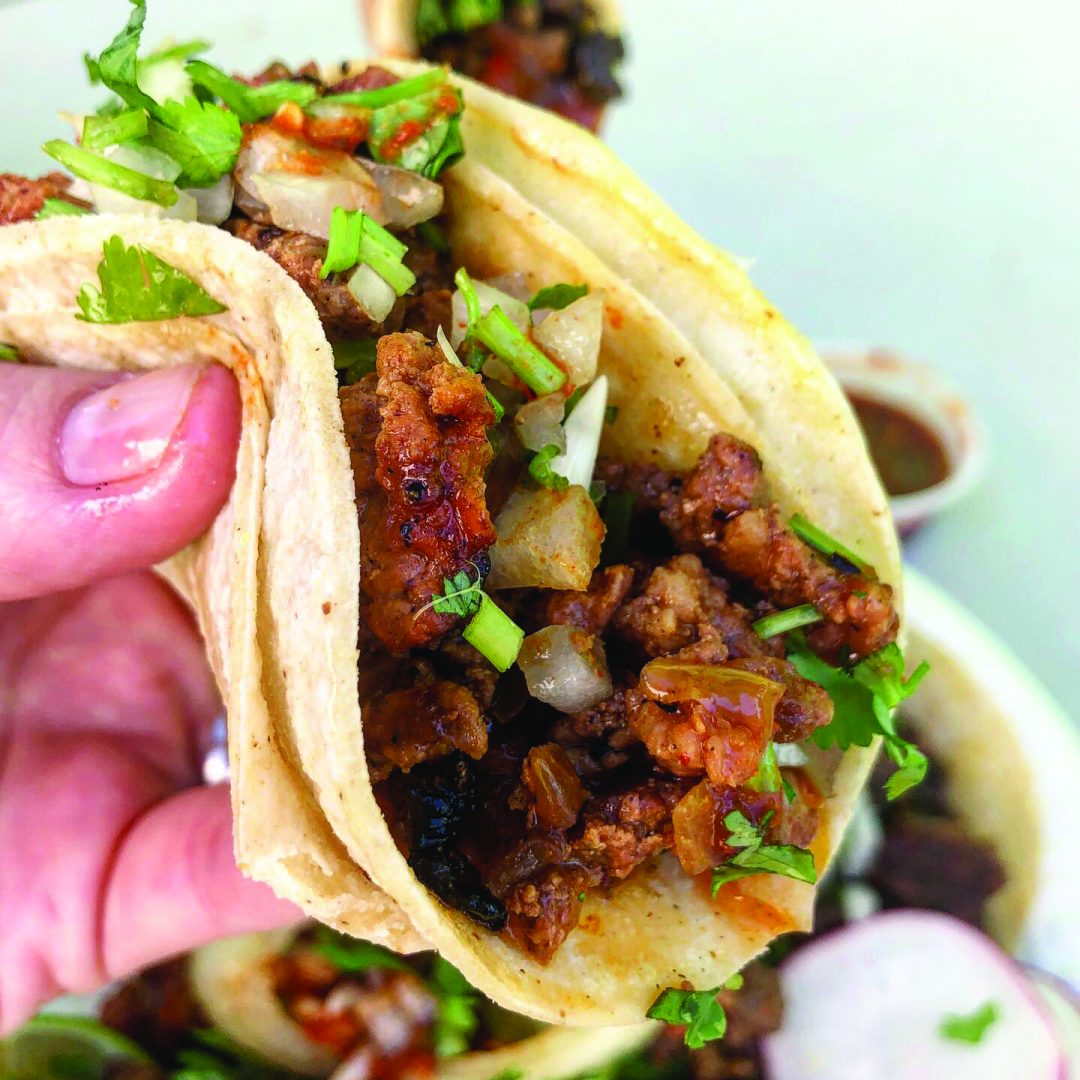
You mentioned that during the Southern California trip the networks and the people that you met, is there potential that there might be a bit of a franchise?
In the end, you do have to start planning because it turns into a bigger thing and you can’t just wander through forever.
We wouldn’t have more trucks because, in Auckland for example, it’s very hilly, and the weather is unpredictable. In California, it’s flat and sunny all the time – perfect food truck weather. In Auckland, it’s rainy and hilly all the time.
If we franchise four trucks out to four gigs and there was a storm that weekend so no one comes out to the gig and you didn’t sell much, you could lose $5,000 in one day. If you do that five times, you’re $25,000 down.
The truck doesn’t work as a franchise in our experience. It’s hard enough to have one. Potentially a brick and mortar place, a taqueria. We’ve actually been approached by Commercial Bay, Auckland Fish Market, Ponsonby Central. We’ve actually had offers from five different places.
Every week we get a call from a mall in Dunedin saying, ‘Do you want to open a Lucky Taco in our mall?’ Which we don’t, we don’t want to be next to McDonald’s or KFC. We’ve established our brand that much, that we don’t want to be in a mall.
The idea is quite attractive. Having said that, I know a lot of restauranteurs and people and they say once you’re open, you need staff, you need ingoings and outgoings, you need licences. It encompasses your whole life. Unless we could put all of our concentration into it, it probably wouldn’t work. At the moment, all our concentration is used up with other stuff.
With a place like these food zones, places like Auckland Fish Market, we would be in with some other very cool food brands. It’s not mall-style. However, they need you to be open from 10 in the morning to 10 at night, seven days a week. If it’s seven days a week, you need at least two people on two shifts. That’s four people a day, seven days a week. That’s potentially 28 people. Then all of a sudden, you’ve got 25 staff and you’ve got a manager. It’s your problem.
What we’d probably do is if we found a cool little spot in Kingsland that was small, we could do five tacos, five different beers and five tequilas. Just super stripped back, only do tacos. It’s not a Mexican restaurant, just a taco joint. I’d quite like to do that because then we could dictate the hours and we could do it our way, rather than to someone else’s demands.
There’s so much to consider. People think it’d be great and there huge queues out the door. But it’s a hell of a lot of work and we were already doing a hell of a lot of work. The business right now is running really well.
Sarah runs the business. She’s the boss. The Lucky Taco is her baby, her dream and her achievement. I’m just her lovely assistant. We’ve done it together, but it’s her recipes, it’s her ideas. She runs the business and all the hot sauce and the meal kits and takes the bookings for the truck. I’m just the tattooed guy standing there helping her out.
For four years, I basically didn’t draw a picture or do any art, because we were in the truck five days a week. It was huge. But now, since we’re only doing the truck one or two days a week, I’ve got a studio in New Lynn. I go out to my studio on Monday at around nine or 10 o’clock and I stayed there until five o’clock at night, maybe four days a week. I draw pictures and do logos and make paintings and do screen prints.
Have you got any advice for couples who work together?
I do know a couple in the food industry who started a business together and they’ve just broken up and dissolved their business, because it was too hard. My advice would be to not do it, it takes so much grit and grim determination to get there and that’s why a lot fail.
I wouldn’t say don’t do it under any circumstances, but just be prepared for the s**t storm. You really have to tough it out. We nearly lost everything couple of years ago, the house, the business.
We got into some deep s**t with some real ruthless assholes and it nearly broke us, but it didn’t break the marriage. That was strong the whole way through. But we were left with some huge bills that we couldn’t afford to pay.
So many small businesses go through these times when the walls feel like they’re closing in and it changes the whole dynamic of the partnership. How do you and Sarah deal with that?
We’re just a good partnership. I’ve no other explanation for it. Sometimes it’s us against the world. My family live in Auckland. My mum and dad are super cool. I see them all the time, they’re very supportive. They lent us some money interest free when we needed it and we paid them back.
It would be really hard if, for example, you were an immigrant couple and everything went down and you had no one to help or to fall back on. That would be the end of us, if we were by ourselves. I’ve lived in Auckland my whole life, so we’ve got lots of friends, support network, family. A lot comes back to that.
What’s the best piece of advice you’ve ever been given?
My mum’s mantra of just don’t be a dick, is good. I’m nearly fifty, I’ve lived in Auckland my whole life. I don’t have any enemies and I haven’t burned any bridges. I think it’s important because if someone thinks you’re a sh**ty guy, then you’re kind of f**ked. So just don’t be a dick.

